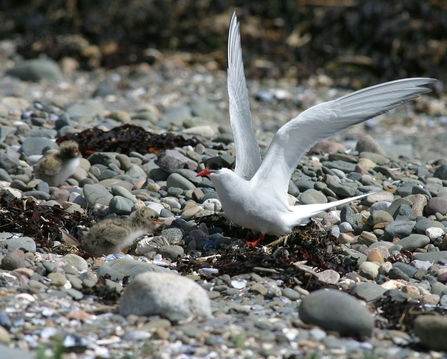
Arctic tern chicks like this are very hard to spot on shingle © J Sheldon

Arctic tern chicks like this are very hard to spot on shingle © J Sheldon
Breeding season is underway at South Walney Nature Reserve near Barrow (March to August). Visitors flock here to see the amazing array of birdlife, from Arctic tern and oystercatcher to eider duck, ringed plover and lapwing, as well as skylark and meadow pipit. But all of these birds are ground-nesting and so are particularly vulnerable to disturbance at this time of year.
Paul Waterhouse, Reserves Officer at South Walney Nature Reserve, said: “This is a wonderful place to visit, both for experienced birdwatchers and those who are discovering birds for the first time, and we’re about to reopen our hide (which was damaged by vandals last year) which will make the visitors’ experience even better. South Walney is a great place for families too, with activity trails to follow and we regularly have staff and volunteers on site, to explain all about the wildlife and help visitors get the most out of their visit. But sadly we’re getting lots of reports of recreational disturbance of wildlife by people and their pets, which is particularly alarming as nesting season is now underway.
“There are two important things to remember when visiting us at South Walney Nature Reserve: first, please stick to the clearly-marked footpaths, away from the beaches which are out of bounds. It can be really hard to see the speckled birds’ eggs and the little chicks can be extremely well camouflaged too, and almost impossible to spot amongst the shingle that’s found all around the shoreline at South Walney.
“Secondly, please remember that dogs are not allowed at South Walney, apart from assistance dogs. This is really important as even a very well-behaved dog on a lead will scare birds away from their nests. These wonderful birds need peace, and disturbance from people and their dogs could seriously threaten this year’s nesting season. With everyone’s cooperation, we will continue to help nature recover, by providing safe habitats for these birds to return to our nature reserves year on year.”

Arctic tern eggs can be easily camouflaged by surrounding pebbles © Duncan Cooke
To help visitors appreciate the importance and vulnerability of the wildlife, a seasonal warden will soon be starting at South Walney Nature Reserve, funded by Life on the Edge which aims to improve our coastal habitats. The warden’s role will be to raise awareness, both here and at nearby Foulney Island Nature Reserve, of the importance of not disturbing the rare ground-nesting birds.
Wez Smith, Project Manager at Life on the Edge said: “The shores of Walney Island and the surrounding coast are a fantastic area for enjoying all that nature has to display. It has some of the best that the Atlantic coast has to offer. By carefully sharing these shores with our ground-nesting birds and coastal nature, we can make sure future generations of people and wildlife get to have the same, wonderful experience at these amazing sites”.
A recent report* showed that the protective measures in place at South Walney – clearly marked footpaths, no access to beaches and a no-dog policy - are helping the birds. Neighbouring nature reserves, such as North Walney, where there are equally good habitats for shore-nesting birds, are Open Access. These beaches are well-used recreationally, which makes the shore-nesting birds especially vulnerable. For example, in 2022, 20 pairs of oystercatchers were recorded at South Walney, and 11 chicks fledged, compared to three pairs at North Walney and no chicks.
Jim Turner, Senior Reserves Manager at Natural England said: “North Walney National Nature Reserve has important habitat for ground-nesting birds. The reserve is Open Access but you must keep your dog on a lead and if possible try to avoid sensitive areas, such as the shoreline shingle. Signs are up on the reserve to highlight sensitive areas and reserve staff will be monitoring and protecting nests.”
Paul Waterhouse explained that there are two further sources of recreational disturbance at South Walney Nature Reserve which regularly get reported: water sports, in particular jet skis, and drones. Both are liable to disturb not only the birds but also the grey seal colony that hauls out at the nature reserve. No drones are permitted on South Walney Nature Reserve (the seal colony is drone-surveyed only by trained Cumbria Wildlife Trust staff with the appropriate licence) and Paul asks that water sports enthusiasts please keep well clear of the beaches and seal colony.
If all visitors respect these protective measures, it promises to be another successful year for South Walney Nature Reserve, especially following the installation of predator-proof fencing in 2022.

Eider ducks are among the many ground-nesting birds found at South Walney Nature Reserve © Cumbria Wildlife Trust
To protect wildlife, there is no access to the beach or seal colony. Please stay on the way marked paths.To protect wildlife, there is no access to the beach or seal colony. Please stay on the way marked paths. Please note: only assistance dogs are allowed on the nature reserve.